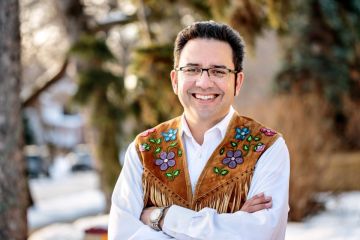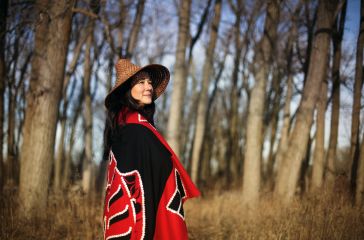Age of wisdom: Alumna advocates for seniors during COVID-19
Peter B. Gustavson School of Business
- Sacha Milam

A lot can happen in 24 hours…especially these days. When Isobel Mackenzie, BA ’87, MBA ’97, boarded a flight on March 11, 2020 from Williams Lake Regional Airport to head home to Victoria, she could never have predicted what lay ahead.
“I had just given a talk to a full house at the local senior’s centre and while there were a lot of questions, not one of them had to do with COVID-19. When I arrived at Vancouver for my connecting flight, it seemed a lot quieter than normal, which was weird. That was the last time I boarded a plane before everything changed.”
Decades in the service of seniors
As BC’s first Seniors Advocate (a role she assumed in 2014 after working with seniors in home care, licensed care, community services and volunteer services), Mackenzie spends almost as much time in the air as on the ground, as she travels from town to town raising awareness about issues facing today’s seniors in BC. With 24 years spent serving one of the populations that is most at risk from COVID-19, she was acutely aware of the vulnerabilities faced by the elderly, long before the pandemic hit.
“I don’t think people really appreciated quite how vulnerable many seniors are, but when the pandemic struck, it was the equivalent of someone’s house burning down with an insufficient insurance policy. Issues were revealed in plain sight,” she explains. Issues that include ageism, isolation, sub-standard care in nursing homes, financial challenges, safety and independence, or lack thereof.
To say that Mackenzie has had a crazy start to 2020 would be, as she rightly says, an understatement. “I don’t think we could have envisioned the extent to which this pandemic would dominate our lives, and the lives of the elderly, many of whom live alone,” she explains.
But what followed surprised even Mackenzie. The community started rallying around the vulnerable: merchants began delivering essentials and setting aside specific times for the elderly to shop, and neighbours volunteered their time to check in on those at risk and without sufficient means to support themselves. “While the pandemic has exposed all of the vulnerabilities, and there has been an awakening when it comes to what life in long-term care looks like, it has also exposed how much people care.”
Lessons learned
While it is still early on in our journey with COVID-19, Mackenzie says enough time has passed that we can begin to look back at lessons learned. “When the fire that is COVID-19 ignited we spent the first few months trying to get the flames under control. We now need to reflect on how the pandemic has affected many of us and how to best move forward.” Her office is undertaking initiatives like a survey of long-term care residents and their families, which asks for their experiences during COVID-19, to begin understanding the impact.
One issue that wasn’t top of mind at first was the fear that comes with learning to take such a threat seriously.
“In order to get our message out there and to get people to comply with safety precautions, health officials really had to hammer home the seriousness of this virus. It was like telling an overweight person they’re going to die of a heart attack, or telling a smoker they will die of lung disease. You have to offer the worst-case scenario to get people to act. I don’t think we are going to completely understand the impact that had until we can study it more in retrospect,” she says.
In the meantime, Mackenzie says her role and its focus hasn’t changed much in recent months (aside from a heavy increase in media calls and no flying). Instead, the pandemic has highlighted everything she has been working on since the start of her career in elderly care. Concerns such as a senior’s right to live independently, consequences of social isolation and other quality of life considerations are all more pressing than ever.
Future of Advocacy
This ability to stay focused on the long-term issues is going to be essential for Mackenzie in the months to come. The task is not only to address persistent, existing issues for the elderly, but also to understand new issues that may arise for future generations of seniors.
However, Mackenzie is optimistic about what’s ahead.
“Are we going to be a gentler and kinder place when the pandemic is over? We’ve already shown how much we care for our seniors, so I am hopeful. The challenges faced by our elderly and those who care for them have come to the fore now, and with the pandemic expected to be around for a couple of years, we will continue to learn and hopefully make sure our elderly don’t feel neglected and alone. My job is to help build a better system to support seniors and convince the policy makers to provide the necessary resources to implement it. Or, to put it more in business school terms, find an unmet need, build a product to meet that need and sell the product to those who need it…very much what Gustavson taught me to do.”
Career in Profile
Isobel Mackenzie has spent more than 20 years advocating for seniors. Here’s a snapshot of where she’s come from.
1987: Graduates from UVic with BA in political science
1994-1996: Earns her MBA at UVic
1995: Becomes CEO of Beacon Community Services, BC’s largest not-for-profit agency. She led:
– A new model of dementia care that has become a national best practice
– The first safety accreditation for homecare workers
2000: Receives certificate in Health Care Leadership from the University of Toronto
2005: Nominated as a Provincial Health Care Hero
2012: Named BC CEO of the Year for the not-for-profit sector
2014: Named BC Seniors Advocate, the first role of its kind in Canada
Originally published in the winter 2020 edition of Business Class magazine.
Photos
In this story
Keywords: alumni, community, health, student life
People: Isobel Mackenzie
Publication: Business Class






